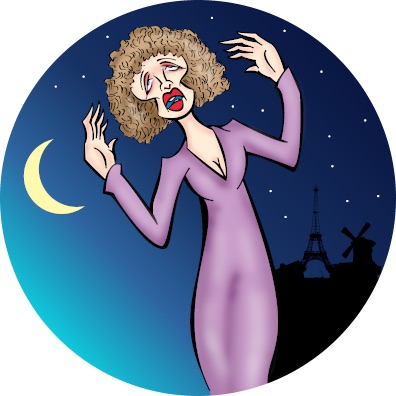Edith Piaf

Clickez sur l'image pour zoomer et dézoomer
We have to be honest. If you're looking for some cheerful happy tunes to whistle while you work, you probably don't want the chansons realistes of Edith Piaf. For instance, there's her song "Il pleut" ("It Rains"):
It's raining
As directed by a call.
The birds are deserting the sky.
The windows, a tear in the eye.
They all seem to wear mourning clothes
For beautiful days.
And this is one of her more cheerful tunes!
But her lyrics do fit in with her experiences as a young woman growing up in Paris in the early 20th Century. Details, though, of Edith's early life are a bit obscure. She herself liked to spin a good yarn and the documentable wheat from the traditional chaff is at times hard to sift.
But we do know that Edith was born Edith Giovanna Gassion in Belleville which is now one of the more artsy and diverse neighborhood of Paris. The story that her mom, Annetta, gave birth to her on the streets is due to Edith saying Annetta nearly had her on the streets and then in later tellings dropping the "nearly". Actually Edith was born in a hospital December 19, 1915. Her dad, Louis, was an circus acrobat, and Annetta was a singer.
Louis wasn't there for Edith's birth, though, since like many Frenchmen of the time he was off fighting in The War That Didn't End All Wars. Maybe hitting five feet if he wore boots, Louis wasn't around for much of Edith's early childhood, either.
In fact, neither was her mom. By the war's end, Louis had left the family and Annetta had turned Edith over to her mother, Emma Saïd Ben Mohamed. Using the stage name Aicha, Emma was Moroccan by birth and was immortalized as the central figure in the painting La danse mauresque (The Moorish Dance) by Henri Toulouse-Lautrec. Evidently Emma didn't take care of Edith too long since after the war Louis showed up again and with his sister, Zaza, took Edith into the household of their parents in Bernay, Normandy.
The - ah - household was quite large. It not only included the immediate family but a bevy of young and unrelated women. Officially the gals were boarders in the home which served as a "finishing school", that is, Grandma Gassion was supposed to teach the young ladies proper deportment. But from time to time the ladies would repair to the upper rooms with a never ending stream of male visitors. Naturally living in what was called a maison de tolerance shaped Edith's outlook. So her lifestyle was at times a bit at odds with Traditional French Family Values.
While living at la maison, Elizabeth developed acute keratitis, an eye inflammation that kept her eyelids partly closed. Naturally she couldn't see very well and she was treated by various ointments which required her to keep her eyes bandaged.
As Edith told it the ladies of the house decided that divine intervention was needed. So on their day off some of them took Edith to the grave of St. Thérèse of Lisieux. Ten days later Edith told everyone she could see.
However, a later acquaintance said Louis's mom told the story as a bit reversed. Edith regained her sight, yes, but it was after the doctor's treatment. It was only later that everyone hied to offer thanks to St. Thérèse.
Edith was doted on by the ladies, but evidently her dad didn't think the "finishing school" was a suitable environment for a young girl. So he once more fetched her and Edith became part of the circus where Louis was performing.
At that time circuses were not the extravaganzas that they became under the direction of John Ringling North. Instead they might set up their performances in the streets of whatever town they found themselves in. The performers' income was determined by whatever the crowd would chip in.
From her father Edith inherited her small stature - she was either 4'8" or 4'9" depending on the source - and from her mom it was a voice that caught everyone's attention. Even as a young girl Edith was singing professionally.
Evidently Louis wasn't all that pleasant a chap as you might guess from Edith's song "Dans ma rue" ("In My Street"). While still in her teens Edith left her dad and took out on her own. For the next few years she sang on the street corners and in small cafes of Paris for a few centimes, sous, and francs.
Then at age 19 she was singing by the Arc de Triomphe when a fancy dressed mec named Louis Leplée stopped by to listen. After she finished the song, he told her that she was singing too loud and might ruin her voice. She should get into the less strenuous cabaret performance instead. So why not come and audition at his club, Le Gerny's?
Although one of her friends warned Edith that Louis had some less than savory connections with the Parisian underworld, she showed up at the club. After hearing her sing, Louis said he'd hire her if she'd learn some new songs and also find better clothes. Due to her small size, Louis dubbed Edith "La môme Piaf" - "The Little Sparrow" - and she decided on "Piaf" as her nom de scène.
The pay at Le Gerny's was 40 francs a night which is about $2.80 at the then-exchange rate. This seems a bit chintzy but it was at least a bit better than the average worker made. In 1924 shoemakers in France were making about 200 francs per week which was higher than in most other industries. So if Edith worked five nights a week she'd get her 200 francs.
Louis had Edith focus on the chansons realiste - ballads about the down and out inhabitants of France - and Yvonne Vallée (who was married to Maruice Chevalier) loaned her some fancy shoulder scarves to help disguise her rather ragged clothes. Maurice was in the audience for her first performance at Le Gerny's and like the others was enthusiastic about the new performer. "She sings straight from the guts," he commented.
Things went well - at least for a few months. Then on April 6, 1935, Louis was murdered in his Paris flat by - as is said - "persons unknown". His maid said four men stormed the apartment and shot Louis before he could get out of bed. For some reason Edith was what we might now dub a person of interest and was grilled by the gendarmes. However, with no evidence to indicate she was involved, she was soon released.
The notoriety, though, almost crashed Edith's career. But she soon began working with the songwriter Raymond Asso. Raymond had never really hit it big, but the combination of his lyrics and Edith's singing brought both of them to national fame. For the rest of the 1930's Edith's star was rising.
But soon there was a war on - World War II, that is. Edith remained in Paris which was occupied by the Germans beginning in 1940. As you might expect Paris was a favorite spot for German soldiers, particularly the officers, who were wanting a bit of R&R in the nightclubs and cabarets. So it was inevitable that after the war Edith was called to task and suspected of being a collaborator. However, everything turned out OK when it was proven that she had actually assisted French soldiers to escape from German prisoner of war camps.

Ed Sullivan
The Big Time
Edith's timing was pretty good. She had become a star when electronic entertainment was pushing out live performances. She sang on radio programs, was featured in motion pictures, and as the 1950's brought in the modern era, she appeared on television. Naturally this necessitated travel to the United States where the boob tube was becoming omnipresent. If any further proof of her fame is needed, she sang on - get this - The Ed Sullivan Show. Today you'll hear her songs on many soundtracks, either sung by Edith herself or by others. And yes, Edith sang in Carnegie Hall.
The Fifties, though, were a rough decade for Edith personally. In 1951, she was involved in three car crashes that led to her taking morphine to ease the pain. She also developed rheumatoid arthritis which she also treated with painkillers. Although she did undergo drug and alcohol rehabilitation, once out of the hospitals she would soon lapse back into addiction. She also had a red blood count that was so low that once she had to be taken to a hospital for a transfusion.
The trouble was her liver had pretty much ceased to work. Edith was put on a special diet of noodles and fish and warned that any lapses could send her into a medical emergency. On June 20, 1963, Edith went into a coma which lasted eight days. Later she again went into a coma again but also recovered. But by October she was spending most of her time in bed and she died October 10, 1963, not yet 48.
References
No Regrets: The Life of Edith Piaf, Carolyn Burke, Knopf, 2011.
"Edith Piaf", Biography, April 2, 2014 (Updated: June 24, 2020).
Measuring Worth, Lawrence Officer, Professor of Economics at University of Illinois at Chicago and Samue Williamson, Emeritus Professor of Economics, Miami University.
Monthly Labor Review, September, 1924, p. 72, "Prices and Wages by Decade", University of Missouri-Libraries.